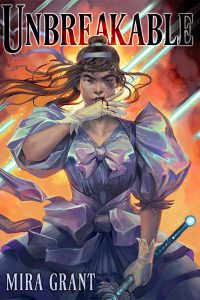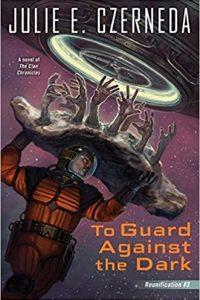Fiyah, Flash Fiction Online, Escape Pod, and Strange Horizons: Short Fiction Reviews by Charles Payseur
 Fiyah Summer ’24
Fiyah Summer ’24
Flash Fiction Online 7/24
Escape Pod 7/25/24
Strange Horizons 7/15/24, 7/29/24, 8/12/24
The Summer ’24 Fiyah theme is disability. The issue seeks to break down stereotypes and expectations that Black people are monolithic and separate from experiences with disability, and it does sharp work of just that, as in F. Kirk’s “Worms Fill My Mouth”, which finds Isaac experiencing an acute horror that the rest of the world is eager to dismiss. Not that Isaac is unique in that – worms infesting people, giving them extra teeth and pain from their movement beneath the skin is a larger societal problem that most people have embraced as the new normal rather than taking the steps necessary to stop or even slow the spread. And for those like Isaac who end up with a chronic case that doesn’t go away, there is no promise of release or relief except for in the ultimate sense. For them, there is only the growing presence of a monster known as the Meat, which rots everything it touches, from food to relationships. Kirk blends body horror with the lessons unlearned from global pandemics to craft a creeping and spine-tingling story about isolation, suffering, and through all that the resilience and power of connection and hope. It’s well worth sticking with to the end. Mwanabibi Sikamo examines family and injustice in “The Tomb of the Forgotten Soldier”, which unfolds as a young woman’s inquiry into her family’s past through documents and artifacts she uncovers in their garage, which her father is reluctant to acknowledge or explain. Through her own investigation she finds the story of Zambians conscripted into a World War, fighting and winning for a colonial power that betrays them out of fear of their power. But killing those with magical ability didn’t dispel the power, and it lingers, waiting to be released and remembered so that some kind of justice can happen, and a family can start to heal from the deep wounds of history and conflict. Sikamo teases out the mystery of the story slowly, allowing time and space for the narrator to come to terms with what she discovers, and where she goes from there. It’s grim but with a core of strength and family that cannot be broken. In the issue’s poetry, Akua Lezli Hope imagines a paraplegic woman and the giant alien robots who offers her a new kind of body as his copilot in “Giant Robot and His Person”. The poem explores the relationship between robot and woman – partly two different people learning about each other, but also part romantic, part sexual, part freeing because together they can do so much more than they could apart. The assistive technology that the robot offers does not erase her disability, but it does open her up to new kinds of experience, new ways of interacting with not just herself and her body but with the world, the galaxy, the universe. It’s expansive, and Hope does a fantastic job capturing this blending, this partnership, this joining. It’s beautifully done!
Flash Fiction Online’s July issue features a novel take on alien visitation with Vivian Chou’s “Perfect Vaca, No Filter”, which is framed as a series of reviews for an exclusive review… made during first contact with an alien race. The review and response format provides for a rather humorous tone as entitled and wealthy vacationers are reminded that climate change and poverty don’t stop existing just because people want an “exclusive” experience. And Chou deepens the critique as an actual alien visitation lays bare just how poor representations of humanity these kinds of wealthy “guests” are compared to the professional and competent resort staff, who find themselves more than ready to meet with and accommodate the new, polite visitors from afar. It’s a case where the framing really adds a lot of layers to the story, taking aim at and revealing how people treat service and hospitality workers, especially in foreign countries, and giving it all an interesting twist. It’s a charming and well-constructed story!
Kristen Koopman closes out the July Escape Pod originals with “The Scientist Does Not Look Back”, which is full of allusions to Frankenstein as a scientist named Victor attempts to reanimate his dead husband against the wishes of his university, his husband’s intolerant family, and his own doubts and fears. But with a time limit on how long he can keep the body viable, he pushes ahead, trying again and again to further his technique enough to undo this tragedy. The piece aims and hits emotionally, pulling readers into a heavy sequence of grief, hope, and probably inadvisable science. Koopman keeps the prose intensely focused throughout, with Victor driven by his need to not lose the man he loves, weaving in references to not only the obvious source but also the story of Orpheus and Eurydice, as he refuses to look back in his mission to undo death. It’s a triumphant and rewarding read!
Strange Horizons’s July issue features Steven Archer’s “Pelt”, a beautiful and aching story about Louis, a queer drag performer living in Orlando and returning to their family home for their niece’s first birthday party – to a house full of emotional baggage. Present are a mother who deeply disapproves of their lifestyle, a father who left the family to be with a woman who has recently died, and a brother with a family that seems to be exactly what their mother wants for her sons. Meanwhile, the one thing Louis has inherited from their mother is that deep emotions and heartbreak cause their skin to peel or molt, which only further complicates their relationship because it’s supposedly something that only women in their family experience. The action of the story is subdued and understated, but Archer really sells the landmines of emotion and self-discovery waiting for Louis when they return to their childhood home. What they go through is messy and complex and hard to summarize, but it’s a brilliant look at families and how they can hurt and heal. The end of July also brought a special issue dedicated to body horror, which includes “Cicadas, and Their Skins” by Avra Margariti, another story that features a narrator who can shed skin. Unlike Louis, however, this narrator leaves her skin in order to inhabit another body, typically an animal’s, which allows her some measure of freedom and escape in the small town she’s sent to after the death of her mother. It’s also something that she shares with the other children there, teaching them how to skin and then inhabit animals, playing and exploring before returning to their own bodies and the limitations of the conservative values of their community. Margariti shows that not all freedoms are clean or without blood. For some, cutting out of a repressive and dangerous place requires fortitude, nerve, and a steady hand regardless of how grim things get. And in keeping with the theme of the special issue, there’s a focus on bodies, change, violence, and needing to sit with the unsettling and upsetting realities of the world. It’s well worth checking out!
Moving into the August Strange Horizons, Oladejo Abdullah Feranmi finds a kind of hope floating down from above in “Letter From a Hot Air Balloon”. In the face of difficulty and doubt, the narrator of this poem finds kind words reaching them, reassuring them, offering some possible comfort and a promise that things will improve. There’s a seasonal aspect to the piece as well, one that at the same time implies that part of the trouble might be the shift from summer into autumn and the waiting winter. But Feranmi evokes the promise of spring that, while it cannot erase the difficulties that winter might bring, at least offers some strength and fortitude against the cold. It’s lovely. And resilience and strength in trying times is a theme that recurs in Aurelius Raines II’s “The Problem With Feelin’ Flo-Jo’s Glory Pose”, which features Tariq, a young man who just wants to run. Despite his talent at it, though, the Olympics aren’t really an attainable goal in a future where wealth inequality and a militarized police state have closed almost all of the doors that might have otherwise allowed him to run his way out of poverty without needing to break the law. Instead, what is left to him is the promise that a local criminal offers regarding a huge payout if he can outrun a police robot designed like a big cat or dog long enough to lead it into a trap. It’s a chance to earn himself some breathing space from the crush of never having enough, but almost more importantly it’s a chance to truly compete, to use his body in a way that feels free and glorious. Raines captures in gripping prose just what that means for Tariq, the embodiment and the speed and the triumph of running, especially in a world where his options are limited, his aspirations cut off by corruption and injustice. It’s a wonderful story!
Recommended Stories
“The Tomb of the Forgotten Soldier”, Mwanabibi Sikamo (Fiyah Summer ’24)
“Perfect Vaca, No Filter”, Vivian Chou (Flash Fiction Online 7/24)
“The Scientist Does Not Look Back”, Kristen Koopman (Escape Pod 7/24)
“Pelt”, Steven Archer (Strange Horizons 7/24)
“The Problem With Feelin’ Flo-Jo’s Glory Pose”, Aurelius Raines II (Strange Horizons 8/24)
Charles Payseur is an avid reader, writer, and reviewer of speculative fiction. His works have appeared in The Best American Science Fiction and Fantasy, Lightspeed Magazine, and Beneath Ceaseless Skies, among others, and many are included in his debut collection, The Burning Day and Other Strange Stories (Lethe Press 2021). He is the series editor of We’re Here: The Best Queer Speculative Fiction (Neon Hemlock Press) and a multiple-time Hugo and Ignyte Award finalist for his work at Quick Sip Reviews. When not drunkenly discussing Goosebumps, X-Men comic books, and his cats on his Patreon (/quicksipreviews) and Twitter (@ClowderofTwo), he can probably found raising a beer with his husband, Matt, in their home in Eau Claire, Wisconsin.
This review and more like it in the October 2024 issue of Locus.
 While you are here, please take a moment to support Locus with a one-time or recurring donation. We rely on reader donations to keep the magazine and site going, and would like to keep the site paywall free, but WE NEED YOUR FINANCIAL SUPPORT to continue quality coverage of the science fiction and fantasy field.
While you are here, please take a moment to support Locus with a one-time or recurring donation. We rely on reader donations to keep the magazine and site going, and would like to keep the site paywall free, but WE NEED YOUR FINANCIAL SUPPORT to continue quality coverage of the science fiction and fantasy field.
©Locus Magazine. Copyrighted material may not be republished without permission of LSFF.







